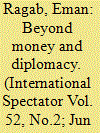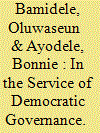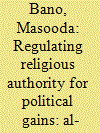| Srl | Item |
| 1 |
ID:
152974


|
|
|
|
|
| Summary/Abstract |
The post-Arab Spring context created a window of opportunity for Saudi Arabia and the United Arab Emirates to reposition themselves in the region as countries capable of using not only money and diplomacy, but also military means in pursuing their regional policies. Their military interventions in Bahrain in 2011 and Yemen in 2015 uncover different aspects of the militarisation of their foreign policies. The permanence of the militarisation of their policies is, however, challenged by the type of interventionist state unfolding from these muscular policies, their domestic and regional legitimacy and the institutionalisation of this foreign policy pattern.
|
|
|
|
|
|
|
|
|
|
|
|
|
|
|
|
| 2 |
ID:
157771


|
|
|
|
|
| Summary/Abstract |
For the crafters and drafters of the African Union’s (AU) Constitutive Acts particularly the Addis Ababa Charter and the Lomé Declaration of July 2000 and the Economic Community of West African States’ (ECOWAS) Protocol on Good Governance and Democracy, the novel idea was to provide a regional, sub-regional, platform of support to democratic governments and also deter any forms of unconstitutionalism. However, recent events have put to the test the political capacity of these organisations to uphold the sanctity of the normative framework and the protocol supportive of democratic processes. In the case of the AU, the outburst of revolutionary movements in the north African region provided a platform for a thorough assessment of the AU’s Normative Frameworks related to constitutionalism and democracy. While it was accepted that the case of Tunisia followed the democratic process, the Egyptian and Libyan cases were seen as a negation of the principles of the framework.Likewise,in the case of the ECOWAS, there were myriads of problems that tested the organisation’s democratic credentials. For instance, Guinea Bissau experienced two coup d’états in two years (2009 and 2012), Guinea in December 2008; Niger in March 2010; and Burkina Faso in 2015. The AU and ECOWAS have been challenged and pulled along by two parallel but not equal forces: the need to ensure respect for the principle of total rejection of unconstitutional changes of government, and the necessity to recognise the reality on the ground. This study therefore employs both historical and comparative methodologies to assess the roles of these organisations in being true to the values of democracy as contained in their normative framework and the protocol, as well asalso examines the challenges faced in the context of the situations in Libya, Mali and Guinea Bissau.
|
|
|
|
|
|
|
|
|
|
|
|
|
|
|
|
| 3 |
ID:
185405


|
|
|
|
|
| Summary/Abstract |
For the last three years, the attention of the world has been caught by the social unrest that has spilled over from events happening in Tunisia to other countries in the MENA region. The region is struggling in both improving historical problems and offering clear path of political stability and economic growth for its current and future generations. In particular the crises in Syria and Libya have intensified the political tensions in the region and brought economic growth into stagnation.
|
|
|
|
|
|
|
|
|
|
|
|
|
|
|
|
| 4 |
ID:
163058


|
|
|
|
|
| Summary/Abstract |
The shedding of blood is a serious matter in Islamic law; disregard for human life negates the very essence of just rule. By standing by General al-Sisi as he suppressed the Muslim Brotherhood, the popular legitimacy of al-Azhar – the oldest seat of Islamic learning – was called into question. This article shows how the al-Sisi government skilfully deployed the two other state-controlled religious establishments, the Ministry of Awqaf (Religious Endowments) and Dar-ul-Ifta, to boost al-Azhar’s popular legitimacy in this context. Existing scholarship highlights the importance of competition within the Egyptian religious sphere to explain how the Egyptian state co-opts the al-Azhari official establishment. This article instead shows how the state, equally skilfully, uses state institutions to boost al-Azhar’s popular legitimacy – albeit to ensure that it remains useful for the purposes of political legitimisation. Political authority and religious authority in Egypt thus remain closely entangled.
|
|
|
|
|
|
|
|
|
|
|
|
|
|
|
|